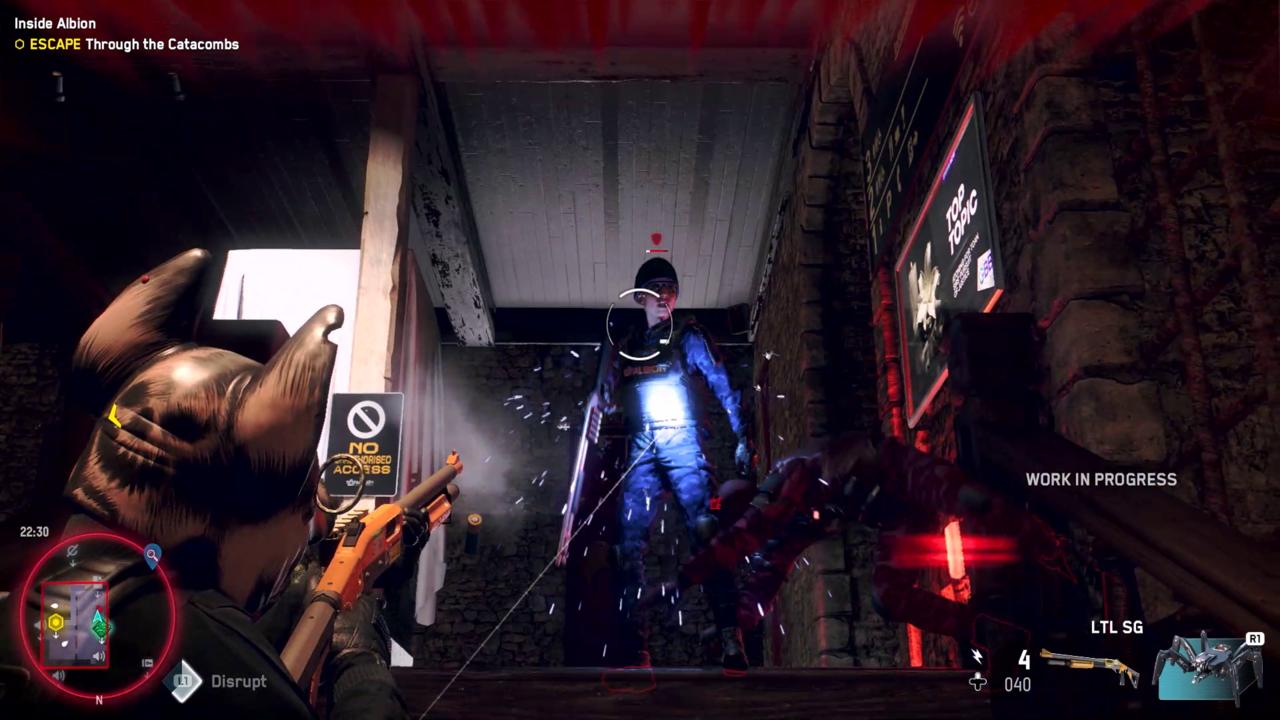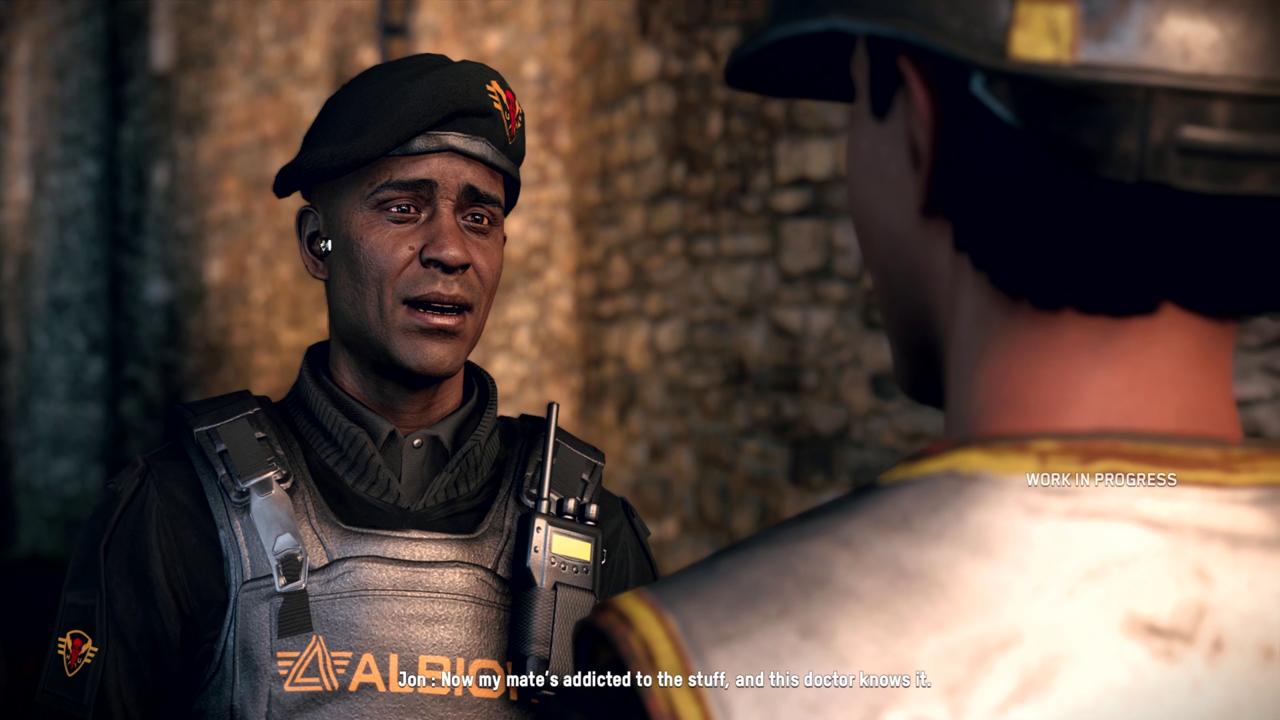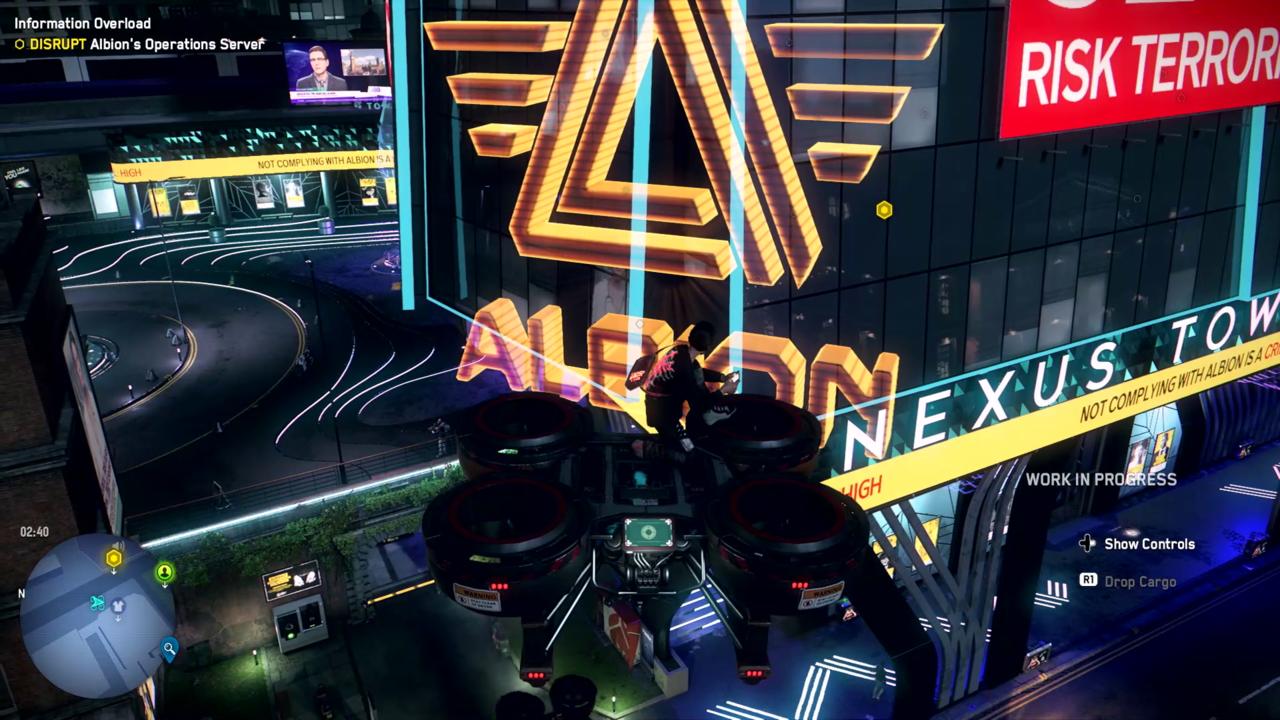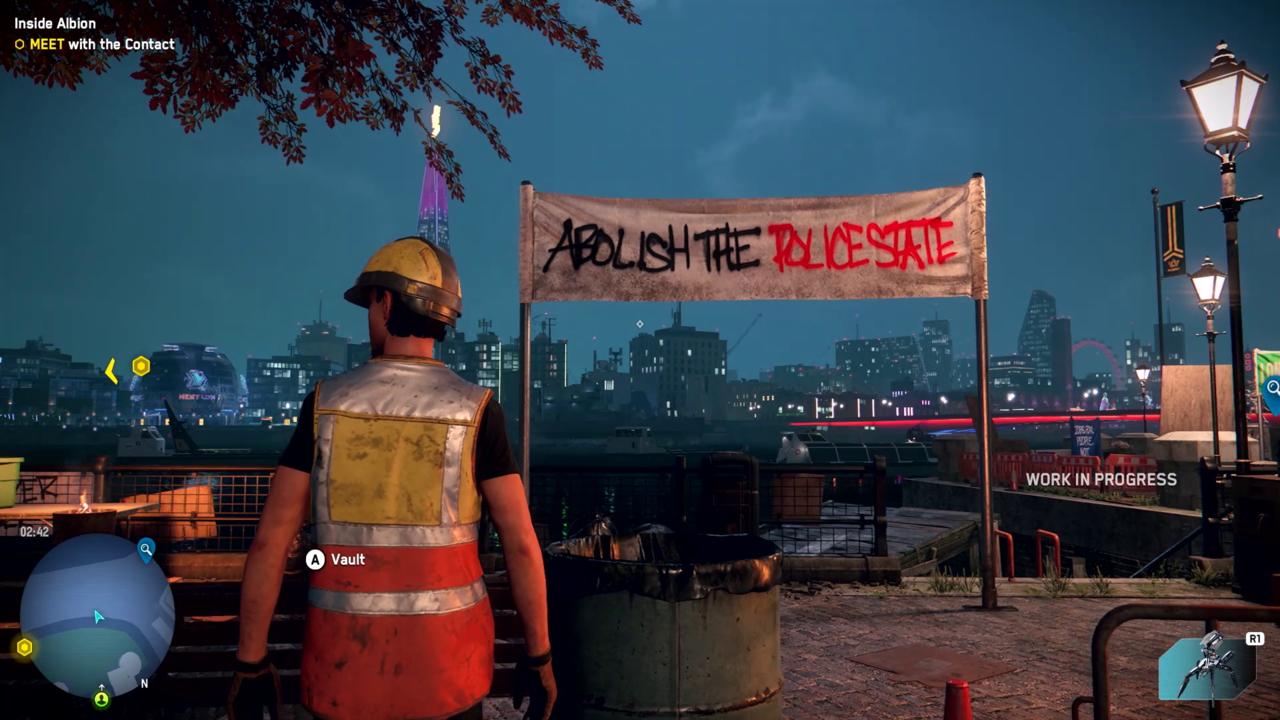After a string of bombings across London, the enigmatic entity named Zero-Day claims responsibility by contacting the first of many operatives you control, before sending in drones to kill that character. Series-long hacker group DedSec is framed for the attacks and London quickly descends into a police state where a private military corporation (PMC), called Albion, takes over law enforcement while organized crime flourishes like never before.
In a presentation, game director Clint Hocking made the point very clear that Watch Dogs: Legion is political. Instead of skirting the topic, Hocking stated this version of London is "inspired by the current times we are living in." He continued, "Social inequalities are growing, partisan politics are stoking the flames of division, nationalism is on the rise, unemployment is up," describing the high-tech dystopian setting. He goes on to point out that Albion are perpetrators of police brutality and abuse, and that DedSec has grown from its hacker roots to a full resistance movement that fights for the common people.
These are bold words, and from a follow-up conversation with Hocking, I get the impression that he and the team are well aware of the context they're working within. But it's one thing to hear them speak on it and another to see how the game itself handles this. I had the chance to play Watch Dogs: Legion in a four-hour hands-on session, and I'll say this: Although I'm hopeful it can deliver a strong message, that doesn't come without its concerns.
For a more detailed breakdown of the gameplay mechanics and the play-as-anyone feature, be sure to read my Watch Dogs: Legion gameplay-specific preview.
Story Missions, In Brief
The demo skipped ahead to about 10 hours into the game, so I was dropped in the middle of the story. Narratively, main missions boiled down to digging deeper into who's pulling the strings behind the bombings and militarized police presence, and uncovering their true motives. First, you track down a hacker who was attacked and taken hostage by Albion, which then gives you a lead to another tech-savvy character who was once close to the villainous leader of Albion, Nigel Cass.
The last available mission had me infiltrating a behind-closed-doors meeting where Cass spoke to his ambitions to deploy what seemed to be a surveillance program of incomprehensible scale. It gave an overall impression of 'evil doer does big evil things so we need to take him down.' Especially when it capped off with Cass shooting a government official in the head during the meeting because he disagreed with Cass' authoritarian methods. This is of course barely scratching the surface of a massive open-world game, though it came off a bit flippant.

Play-As-Anyone As A Narrative Device
Rather, I found value in the narrative elements that surrounded the demo's main missions, and more broadly, the play-as-anyone feature that is the core conceit of Watch Dogs: Legion. Almost every NPC you see on the street can be recruited to DedSec's cause as a playable character. Each will have their own occupation, brief backstory, and specific skills and perks. It's an impressive example of random generation as a function of gameplay, but it emphasizes the theme that revolution is driven by the common people who are willing and ready to take collective action.
You can recruit and play as a well-trained spy, a construction worker, a street artist, a first responder, a tech-savvy millennial, and even former Albion officers who can be convinced to defect. Even if these aren't deeply developed characters like we're used to seeing in other story-driven games, whoever you control will have something to offer to the cause. Sure, it's silly to run about as an MMA grandma or a construction worker who takes out guards with a nail gun while riding a cargo drone, but a bit of gameplay levity shouldn't take away from the system's broader purpose. At this stage it remains unclear how the system meshes with the narrative underpinning the game and the tone and context of the social issues it evokes.
The Things You Do For The People
There's a bit of context built around the play-as-anyone recruitment system as well. You must do something for a prospect in order to convince them to jump on board, to show that DedSec is for real.
The best example I experienced was tied to a main story questline. I needed to recruit a former Albion officer (who's developed a conscience, I presume) in order to infiltrate the aforementioned top-secret meeting where bad guy Nigel Cass would be. This officer's name was Jon John and he told my character that a good friend of his needs a specific medication to live. However, he said the healthcare system is so broken that it won't help and the only way to get the meds is through the organized crime ring, Clan Kelley, which has hiked prices beyond reason.

Ultimately, the mission has you stealing a van full of meds from the gang's compound--a bit of an oversimplified solution, but here, DedSec provided material needs and it got Jon John to join the cause. Of course, London's problems are multifaceted so while you basically did a small part in socializing medicine, you're still living in a police state.
A Private Military Corporation And State-Sanctioned Violence
The "law" runs through Albion, a PMC trained to operate in the theaters of war and failed states, as was described in the preview presentation. They are the ones violently upholding an unjust system and enforcing a police state in London. From the demo, it's not entirely clear as to who put them in power or how their authority came to pass, but here we are.
A concern lingered in the back of my head, though--by placing a PMC as the perpetrators of a police state, the theme of police brutality as a systemic issue and mechanism of state-sanctioned violence can be put to the side, or at worst, avoided altogether. Albion could be convenient to villainize, at the expense of more accurate representation of institutional and systemic injustice at the heart of the context it is mirroring. A boogeyman militia swiftly moving into London and assuming control. It's difficult to shake the impression that this can afford the game to use the imagery and language of a grassroots resistance movement without confronting the hard truths of why revolution happens to begin with.
I asked Hocking about it, and he told me that when Watch Dogs: Legion was conceptualized and written, they needed to have authorities be a threat that's ready to use lethal force against your character for the game to work. He also noted that the common Metropolitan Police officer in the UK isn't carrying a firearm and that a heavily militarized Met wouldn't be a reasonable representation. Hocking also followed up, saying, "That doesn't mean that there aren't real questions that need to be examined and addressed."
Be sure to read my full interview with Watch Dogs: Legion director Clint Hocking for the broader discussion.

The Inseparable Dynamics Of Race
It may have been a throwaway line, but in one dialogue sequence, villain Nigel Cass mentions "illegals threatening our families" as a justification for his authority. Now, if racism is going to be a part of the narrative in some fashion, we should expect the game to touch on that, and if it doesn’t, it’s a failing on the game’s part. Incorporating racial dynamics wouldn't be new for the series, however.
I think back to my favorite moment in Watch Dogs 2, and a mission that has main character Marcus visit Horatio at his job at Google stand-in Nudle. Horatio talks about the awful social and racial dynamic of being one of three Black people working at a giant tech company. What makes the moment work is that these are two Black characters in a genuinely written conversation about how it affects daily life, further emphasized by microaggressions of a white coworker in the cutscene. Watch Dogs 2 touches on this dynamic throughout the game in small ways, too. At the same time, the game relies on stereotypes of Latinx people and gang culture as a means to create villains called the Tezcas, who are responsible for Horatio's eventual murder.
In the context of Watch Dogs: Legion, I expect it to be examined again, especially given Cass's line about "illegals." To understand systemic violence and oppression, which Legion portrays, is to also understand systemic racism. There's no two ways about it.
This is where I'm a bit wary of the play-as-anyone mechanic; our playable character may not have these deeper moments like what Marcus and Horatio had as it relates to race, because we can literally be anyone at any moment. I'm glad to see London's population filled with diverse appearances and identity, but diversity in appearance doesn't always mean diversity with proper storytelling context. I hope that through its NPC's recruitment missions or pre-built characters in the story, Legion doesn't avoid confronting that reality in some way.
The Language Of Resistance
The things characters say, the actions you see on the streets, and the image of uprising all point in the same direction. Characters often speak in platitudes about the power of the people and are willing to plainly point out the evils carried out by authorities. You'll often see random acts of assault on the street carried out by Albion officers against ordinary citizens. And you'll walk through streets with protest banners saying things like, "PRIVATE MILITARY C*NTS," (a bit crass for me, but sure) and "ABOLISH THE POLICE STATE."

But Watch Dogs: Legion can't just be about stealing meds for someone who needs them, saving a few random NPCs from abuse, or liberating London's boroughs on a map to see protest signs flying high. I also hope it doesn't rely on the idea of just taking down 'the big bad evil people' and uses the mystery of Zero-Day to help drive a nuanced message. Language and imagery carries weight, and anti-fascist aesthetics can only get us so far without providing the necessary context.
Don't get me wrong, though. I'm absolutely fired up to see a game so outward about political revolution in an open world that very much reflects our reality. And I have more confidence in Legion than I did prior to playing it. In the here and now, I want more than anything in a game to not only talk big about fighting against authoritarianism but to stick the landing in order to send a powerful, cathartic message.
Optimism And Skepticism
But if a game wants to use real-world revolutionary messaging while portraying a real-world location, it has to do right by it. I want to see how its many themes are examined and explored, and also tactfully contextualized through its story. To use these themes as simple set-dressing would be a disservice, but I do believe Watch Dogs: Legion can offer more than that.
I'm skeptical, as anyone should be, particularly as Ubisoft has—on numerous occasions—said its games don’t make political statements, even when obviously using politically charged situations as the backdrop for its games. With Watch Dogs: Legion, the company is more directly drawing from the current sociopolitical state of the world and, as such, should expect to be met with skepticism and much greater scrutiny.
But that skepticism shouldn't undermine a game before it's even out. Rather it should be the mechanism that sharpens our eyes to give credit where it's due and be critical when necessary once we get to experience the game in its entirety on October 29 this year.

